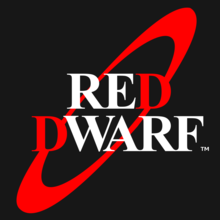
Back ريد دوارف Arabic Червеното джудже Bulgarian El nan roig Catalan Červený trpaslík (seriál) Czech Red Dwarf Welsh Red Dwarf Danish Red Dwarf German Red Dwarf Esperanto Enano Rojo Spanish Red Dwarf Finnish
| Red Dwarf | |
|---|---|
 Logo (1992–99) | |
| Genre | |
| Created by | |
| Based on | |
| Directed by |
|
| Starring | |
| Composers |
|
| Country of origin | United Kingdom |
| Original language | English |
| No. of series | 12, and 1 TV film |
| No. of episodes | 74 (list of episodes) |
| Production | |
| Executive producers |
|
| Producers |
|
| Camera setup |
|
| Running time |
|
| Production companies |
|
| Budget | £250,000 per episode |
| Original release | |
| Network | BBC Two |
| Release | 15 February 1988 – 5 April 1999 |
| Network | Dave |
| Release | 10 April 2009 – 9 April 2020 |
| Infobox instructions (only shown in preview) | |
Red Dwarf is a British science fiction comedy programme created by Rob Grant and Doug Naylor, consisting of a sitcom that aired on BBC Two between 1988 and 1999, and on Dave since 2009, gaining a cult following.[1] The programme follows low-ranking technician Dave Lister, who awakens after being in suspended animation for three million years to find that he is the last living human, and that he is alone on the mining spacecraft Red Dwarf—except for a hologram of his deceased bunkmate Arnold Rimmer and "Cat", a life form which evolved from Lister's pregnant cat.
As of 2020, the cast included Chris Barrie as Rimmer, Craig Charles as Lister, Danny John-Jules as Cat, Robert Llewellyn as the sanitation droid Kryten, and Norman Lovett as the ship's computer, Holly.
To date, twelve series of the show have aired (including one miniseries), in addition to a feature-length special The Promised Land. Four novels were published from 1989 to 1996. Two pilot episodes of an American version of the show were produced but never aired. The magazine The Red Dwarf Smegazine was published from 1992 to 1994.
One of the series' highest accolades came in 1994 when an episode from the sixth series, "Gunmen of the Apocalypse", won an International Emmy Award in the Popular Arts category. In the same year, the series was also awarded Best BBC Comedy Series at the British Comedy Awards.[2] The series attracted its highest ratings, of more than eight million viewers, during the eighth series, in 1999.[3]
The revived series on Dave has consistently delivered some of the highest ratings for non–Public Service Broadcasting commissions in the UK.[4][5][6] Series XI was voted Best Returning TV Sitcom and Comedy of the Year for 2016 by readers for the British Comedy Guide.[7] In a 2019 ranking by Empire, Red Dwarf came 80th on a list of the 100 best TV shows of all time.[8]
- ^ "Red Dwarf on DVD". BBC Worldwide Press Office. 4 October 2002. Archived from the original on 27 February 2010. Retrieved 28 November 2009.
- ^ "Red Dwarf VI released on DVD". BBC Worldwide Press Office. 12 January 2005. Archived from the original on 20 February 2009. Retrieved 5 February 2009.
- ^ "Red Dwarf VIII: Aftermath". RedDwarf.co.uk. Archived from the original on 23 January 2009. Retrieved 5 February 2009.
- ^ "Back To Earth Ratings". RedDwarf.co.uk. 17 April 2009. Archived from the original on 9 March 2016. Retrieved 21 August 2017.
- ^ "Rated And Reviewed: The dust settles on Series X". RedDwarf.co.uk. 23 November 2012. Archived from the original on 7 April 2016. Retrieved 21 August 2017.
- ^ "Topping The Charts: Consolidated viewing figures for Twentica". RedDwarf.co.uk. 7 October 2016. Archived from the original on 12 September 2017. Retrieved 21 August 2017.
- ^ "Comedy.co.uk Awards 2016 winners announced". British Comedy Guide. 23 January 2017. Archived from the original on 3 February 2017. Retrieved 23 January 2017.
- ^ Team Empire (16 October 2019). "The 100 Greatest TV Shows Of All Time". Empire. Archived from the original on 24 April 2020. Retrieved 14 December 2019.